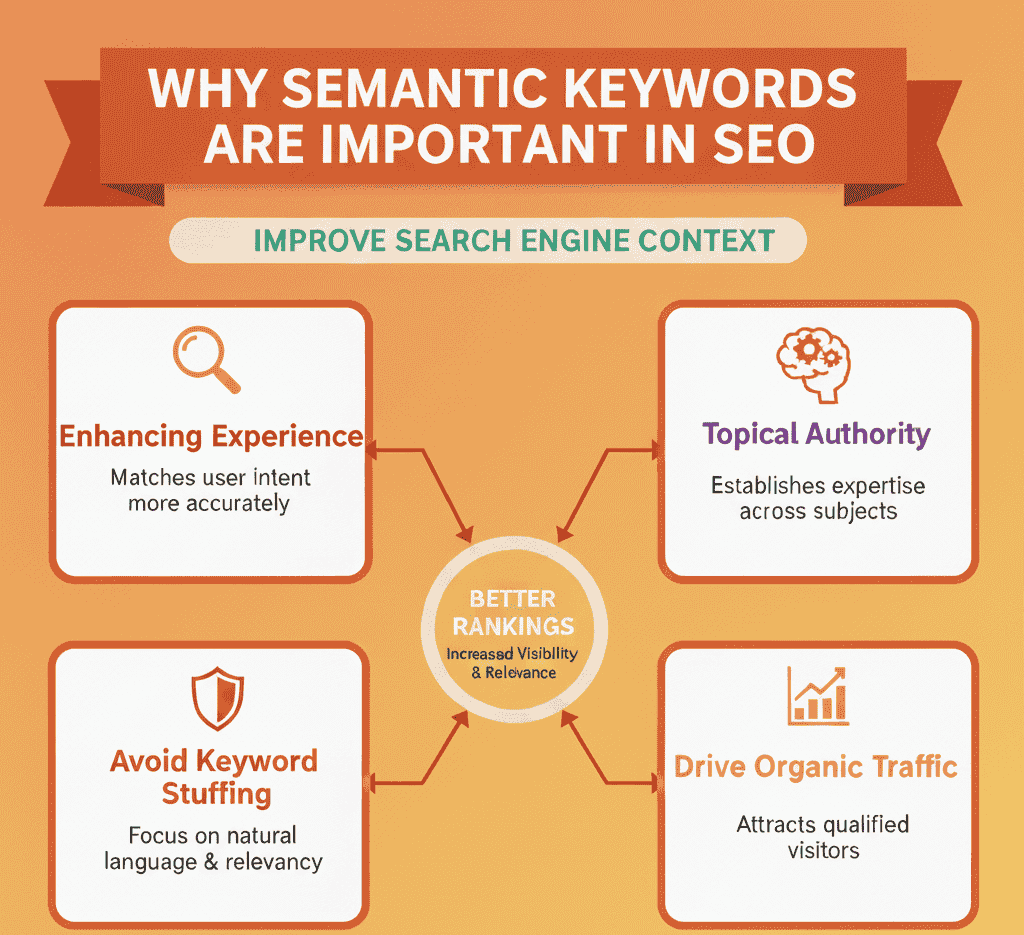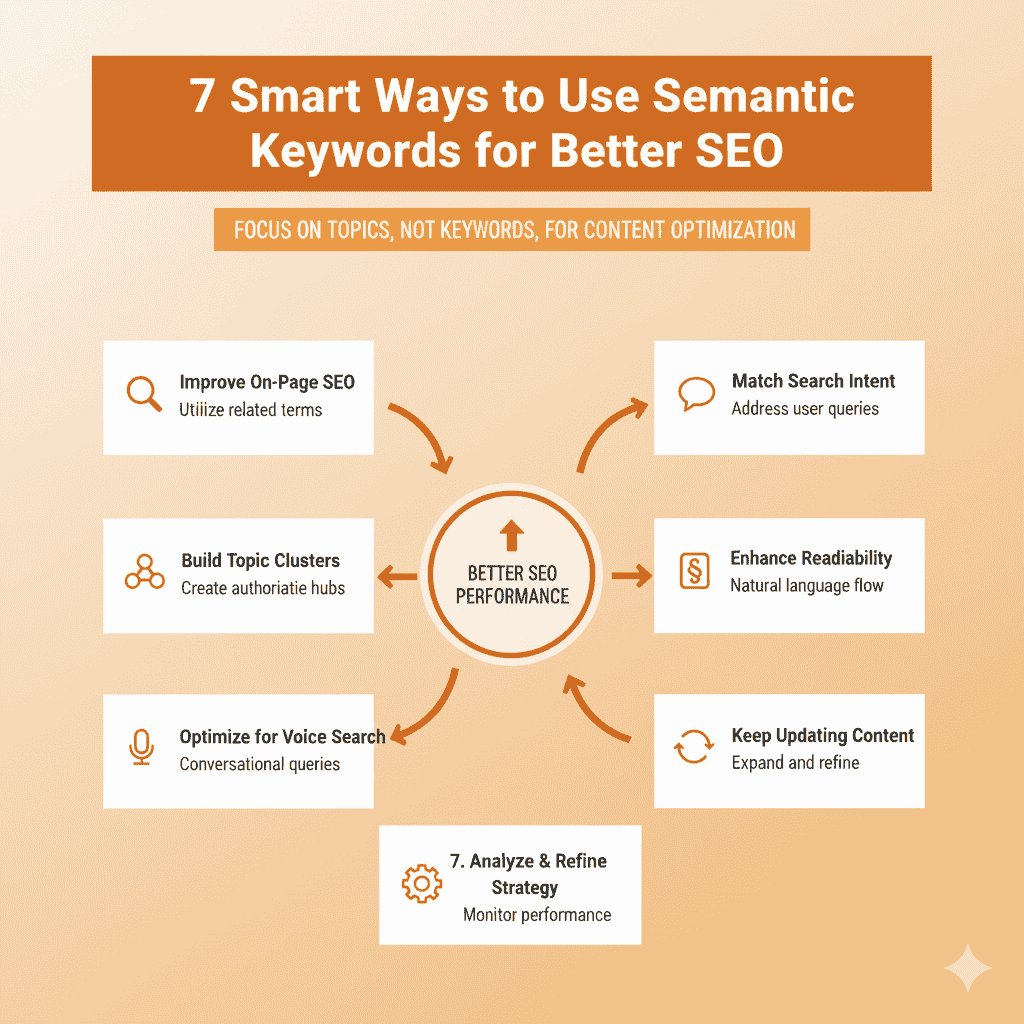- Guide
- No Comment
What Are Semantic Keywords? 7 Smart Ways to Use Them for Better SEO

Search engines such as Google have become much smarter over time, moving from simple keyword recognition to semantic search prioritizing meaning, context and intent rather than repetition of individual words in any content produced for search.
At the core of SEO semantics lies semantic keywords, words and phrases closely connected with your primary keyword that extend its depth and relevancy in content creation. Latent semantic keywords (LSKs), semantically related keywords (SRKs), or LSI keywords play an irrefutable role.
In this blog, we will cover what semantic keywords are, why they matter, and 7 strategies for effectively using them for increased rankings in content strategies.
What Are Semantic Keywords?
Simply stated, semantic keywords refer to words or phrases related to your primary keyword. Instead of repeating “SEO tips” twenty times, choose words such as “search engine optimization”, “ranking factors”, or “organic traffic”.
Search engines use these semantically related keywords to provide more context when making searches; for instance:
Key Word: best coffee shops
Semantic keywords for Cafes: espresso bar, coffee shop, local coffee shop, coffee beans and cozy environments
Google understands this to demonstrate that your content covers not just coffee shop listings but rather culture as an overall theme.
So when someone asks: What are semantic terms in SEO? They refer to supporting words which create meaning and context on pages to make them more search engine relevant for multiple queries.
What Are Semantics in SEO?
SEO semantics refers to how meaning and context influence search rankings. Instead of considering individual words as key terms for analysis by search engines, semantic search examines entire topics, entities, relationships, etc.
Consider it this way:
Traditional SEO: Focusing solely on keywords.
Semantic SEO: Focusing on topics and meaning.
Google recognized this shift when users stopped typing precise keywords; rather, they asked questions or used voice search, or phrased queries differently than they had expected to search for results. As such, its algorithms (RankBrain and BERT) were specifically created to recognize such subtleties through semantic analysis.
Have you been deliberating between keywords versus topics semantic SEO strategy overview, the difference is clear; topics predominate today, while related keywords serve to bridge that divide.
Why Semantic Keywords Are Important in SEO

Semantic keywords play an integral part in SEO. Here’s why they matter:
1. Improve Search Engine Context
Semantic search keywords help Google connect your content to its wider topic.
2. Enhancing user experience
Readers prefer content that feels natural and comprehensive rather than repetitive and boilerplate-esque.
3. Avoid Keyword Stuffing
Employing different forms of language in your text, diversifying can help avoid penalties and create more fluid language.
4. Topical Authority
Examining different perspectives of an issue adds depth, making your content even more authoritative.
In short: semantic keywords SEO = smarter content + increased relevancy.
How to Do Semantic Keyword Research
To establish an effective semantic SEO strategy, conducting careful keyword research is vital to success. Here’s how you can find semantically related terms:
1. Make Use Of Google Suggestions
- Start typing your keyword in Google. Keep an eye out for “Autocomplete” and “Related searches.”
- Type “SEO semantics”, and it could refer to your SEO semantic strategy or Google semantic search as examples of possible results.
2. Investigate “People Also Ask” (PAA).
- Questions related to your keyword will likely come up here; for semantic keyword research, PAA might include things such as:
- What are semantic keywords, and how can they benefit SEO?
3. Utilize SEO Tools
SurferSEO, Ahrefs, SEMrush and Clearscope all provide semantic keyword tagging functionality to assist SEO specialists with more easily targeting related words in SEO strategies.
4. Research Competitors
Take an in-depth analysis of top-ranking articles to ascertain which semantic terms they utilize.
5. Use AnswerThePublic or Keyword Insights.
These tools provide insight into real-world phrasing and long-tail queries for topics relevant to you.
7 Smart Ways to Use Semantic Keywords for Better SEO

Let’s delve into seven actionable methods you can employ when applying semantic keywords strategically.
1. Focus On Topics, not keywords, for Content Optimization
Transition from “keywords vs topics.” Instead of only focusing on one keyword, create content around wider topics instead. For instance:
Instead of: “Best SEO tools”, say:
Consider: Discussing “SEO strategies”, “semantic SEO”, keyword research and ranking tools.
SEO semantic optimization in action!
2. Improve On-Page SEO Utilizing Semantic Keywords
Use semantic keywords naturally:
- Titles and Subheadings
- Meta Descriptions
- Image Alt Text
- Internal Links
For Example, rather than repeating “semantics SEO”, try including variations such as semantic keyword SEO instead.
3. Use Semantic Keywords to Match Search Intent
Search intent is everything; when semantic keywords align with users’ actual desires, your chances of ranking increase significantly.
- 1. Informational Aim: What are semantic keywords?
- 2. Navigational Intent: Semantic Keyword Research Tools
- 3. Transactional Purposes: Find Out the Top SEO Semantic Software Solutions Now
By employing semantically related keywords for every category of questions, you answer more efficiently.
4. Build Topic Clusters with Semantic SEO
Group similar information together. Example:
Main Page Content: Semantics in SEO (Urgent Reminder).
Cluster blogs: Semantic Keyword Research, the Importance of Semantic Keywords in SEO and an explanation of Latent Semantic Keywords are covered here.
This semantic SEO strategy overview helps search engines recognize your site as an authoritative source.
5. Improve Content Readability and Flow
Overuse of one keyword makes text robotic; therefore, consider including more secondary keywords for added variety and to create diversity in your writing.
Bad:
“Semantic keywords are essential components to SEO success; without semantic keywords…”
Good:
“LSI or semantically related keywords enhance content by providing context and variety.”
6. Optimize for Voice Search and AI-Powered Queries
AI assistants and voice search have made queries much more conversational: people simply ask:
- What are Semantic Terms in SEO?
- How Can I Utilize Semantic Keyword Research?
By employing semantic keyword SEO strategies, your content becomes more voice search compatible.
7. Keep Updating and Expanding Your Content
Semantic SEO should not be viewed as an isolated effort; content must be regularly refreshed with new, semantically related keywords and examples to maintain relevance and ensure maximum efficacy.
As new tools for semantic keyword research become available, use them. Doing this ensures your content stays evergreen.
Putting It All Together: The Future of SEO Semantics
SEO semantics is revolutionizing how search engines rank content. Google wants to deliver meaningful search results rather than generic keyword lists stuffed full of generic terms and keywords.
Focusing on secondary keywords, latent semantic keywords and related semantic keywords enables you to produce content that resonates both with readers and algorithms alike.
So the next time you sit down to write, instead of considering “keywords vs topics”, use semantic SEO tactics which focus on depth, clarity and authority for maximum effect.
Conclusion
Semantic SEO is not just a buzzword; it is the future. Regardless of its expression, latent semantic indexing (LSI), semantic keywords, or any other methodology, semantic SEO aims to enrich and contextualise content to its audiences in meaningful and useful ways.
Your website can shine brighter than your competitors and stay updated with a constantly changing digital universe with intelligent semantic keyword research and strategic solutions like topic clusters, intent alignment and natural integration.
In Short: Semantic keywords serve as an intermediary between user intent and SEO success.
FAQs
1. What Are Semantics in SEO?
SEO semantics is about how search engines understand the meaning and context of words. Instead of just matching exact keywords, Google uses it to better understand topics, user intent, and related ideas.
2. What are semantic keywords in SEO?
Semantic keywords are related words or phrases that give more context to your main keyword. For example, if your keyword is ‘digital marketing,’ related terms could be SEO, content strategy, or social media campaigns.
3. What are Semantic Terms in SEO?
Semantic terms are related words that show what a searcher really means. Adding them to your content makes it more relevant and helps it rank for more searches.
5. Why is semantic keyword research necessary?
Semantic keyword research helps you find related terms, synonyms, and context words that make your writing more useful for readers and search engines. Avoid stuffing keywords, as it can hurt both readability and rankings.
9. How does SEO semantic optimization aid rankings?
SEO semantic optimization means creating content that fully matches user intent. It helps cover a topic in depth, build authority, rank higher, and gain lasting visibility.
Alan Mike is a seasoned website content writer specializing in SEO-friendly, engaging content. With expertise in various industries, Mike creates clear, informative, and compelling copy to boost user engagement and drive organic traffic for clients.

